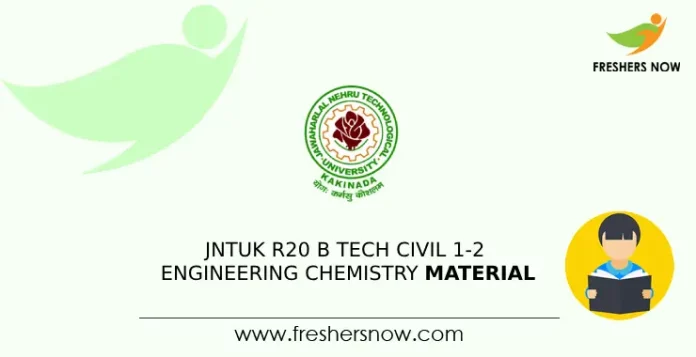
JNTUK R20 B Tech Civil 1-2 Engineering Chemistry Material/ Notes PDF Download: The JNTUK R20 B.Tech 2-2 Engineering Chemistry Material provides comprehensive insights into various aspects crucial for engineering students, ranging from the significance of plastics in household appliances to advanced materials like composites (FRP) utilized in aerospace and automotive industries. This material outlines the fundamentals of constructing electrochemical cells, batteries, and fuel cells, enlightening students on their practical applications. Moreover, it involves the mechanism of corrosion and preventive measures, essential for maintaining the integrity of engineering structures.
JNTUK R20 B Tech 2-2 Engineering Chemistry Material – Units
| No. Of Units | Name of the Unit |
| Unit – 1 | Polymer Technology |
| Unit – 2 | Electrochemical Cells and Corrosion |
| Unit – 3 | Material Chemistry |
| Unit – 4 | Fuels |
| Unit – 5 | Water Technology |
Unit 1 Syllabus PDF Download | JNTUK R20 B Tech 2-2 Engineering Chemistry Material
Polymerization: Introduction, methods of polymerization (emulsion and suspension), mechanical properties. Plastics: Compounding, fabrication (compression, injection, blown film, and extrusion), preparation, properties and applications (PVC, polycarbonates, and Bakelite), mention some examples of plastic materials used in electronic gadgets, recycling of e-plastic waste (waste to wealth).
Elastomers: Introduction, preparation, properties, and applications (Buna S, Thiokol and polyurethanes).
Composite materials: Fiber-reinforced plastics, conducting polymers, biodegradable polymers, biopolymers, biomedical polymers.
| JNTUK R20 B Tech Engineering Chemistry Material – PDF Download | |
| To Download JNTUK R20 B Tech Civil Engineering Chemistry Material Unit – 1 PDF | Reference 1 | Reference 2 | Reference 3 |
Unit 2 Syllabus PDF Download | JNTUK R20 B Tech 2-2 Engineering Chemistry Material
Electrochemical Cells and Corrosion
Single electrode potential, electrochemical series and uses of series, standard hydrogen electrode, calomel electrode, construction of glass electrode, batteries (Dry cell, Li-ion battery, and zinc air cells), fuel cells (H2-O2, CH3OH-O2, phosphoric acid, and molten carbonate).
Corrosion: Definition, theories of corrosion (chemical and electrochemical), galvanic corrosion, differential aeration corrosion, stress corrosion, galvanic series, factors influencing the rate of corrosion, corrosion control (proper designing and cathodic protection), Protective coatings (surface preparation, cathodic coatings, anodic coatings, electroplating and electroless plating [nickel]), Paints (constituents, functions, and special paints).
| JNTUK R20 B Tech Engineering Chemistry Material – PDF Download | |
| To Download JNTUK R20 B Tech Civil Engineering Chemistry Material Unit – 2 PDF | Reference 1 | Reference 2 | Reference 3 |
Unit 3 Syllabus PDF Download | JNTUK R20 B Tech 2-2 Engineering Chemistry Material
Material Chemistry
Part- A: Nanomaterials: Introduction, sol-gel method, characterization by (Brunauer Emmet Teller [BET]), (scanning electron microscopy [SEM]) and (transmission electron microscopy [TEM]) with example (TiO2), applications of graphene and fullerenes, carbon nanotubes (types, preparation and applications)
Thermal analysis techniques: Instrumentation and applications of thermogravimetric analysis (TGA), differential thermal analysis (DTA), and differential scanning calorimetry (DSC).
Part-B: Refractories: Definition, classification, properties (refractoriness, refractoriness under load, porosity and thermal spalling), failure of refractories.
Lubricants: Definition, mechanism of lubricants, properties (definition and importance).
Cement: Constituents, manufacturing, parameters to characterize the clinker formation: lime saturation factor (LSF), silica ratio (SR) and alumina ratio (AR), chemistry of setting and hardening, deterioration of cement.
| JNTUK R20 B Tech Engineering Chemistry Material – PDF Download | |
| To Download JNTUK R20 B Tech Civil Engineering Chemistry Material Unit – 3 PDF | Download PDF |
Unit 4 Syllabus PDF Download | JNTUK R20 B Tech 2-2 Engineering Chemistry Material
Fuels
Introduction, calorific value, higher calorific value, lower calorific values, problems using Dulong’s formula, proximate and ultimate analysis of coal sample and their significance, numerical problems, petroleum (refining-cracking), synthetic petrol (Fischer Tropsch and Bergius), petrol knocking, diesel knocking, octane and cetane ratings, anti-knocking agents, Introduction to alternative fuels (Biodiesel, ethanol, methanol, natural gas, liquefied petroleum gas, compressed natural gas), Flue gas analysis by Orsat apparatus, rocket fuels.
| JNTUK R20 B Tech Engineering Chemistry Material – PDF Download | |
| To Download JNTUK R20 B Tech Civil Engineering Chemistry Material Unit – 4 PDF | Download PDF |
Unit 5 Syllabus PDF Download | JNTUK R20 B Tech 2-2 Engineering Chemistry Material
Water Technology
The hardness of water, determination of hardness by complexometric method, boiler troubles (priming and foaming, scale formation, boiler corrosion, caustic embrittlement), internal treatments, softening of hard water (zeolite process and related sums, ion exchange process), treatment of industrial wastewater, potable water and its specifications, steps involved in purification of water, chlorination, breakpoint chlorination-desalination (reverse osmosis and electro dialysis).
| JNTUK R20 B Tech Engineering Chemistry Material – PDF Download | |
| To Download JNTUK R20 B Tech Civil Engineering Chemistry Material Unit -5 PDF | Download PDF |
For more details about JNTUK R20 B Tech 2-2 Engineering Chemistry Material PDF Download and other materials follow our official website Freshersnow.com.
| You Can Also Check | |
| JNTUK R20 B Tech Civil Mathematics – II Material | |
JNTUK R20 B Tech 2-2 Engineering Chemistry Notes – Outcomes
- Gain insights into computational chemistry to understand molecular structures and interactions.
- Explore the world of molecular machines to comprehend their functions and applications.



